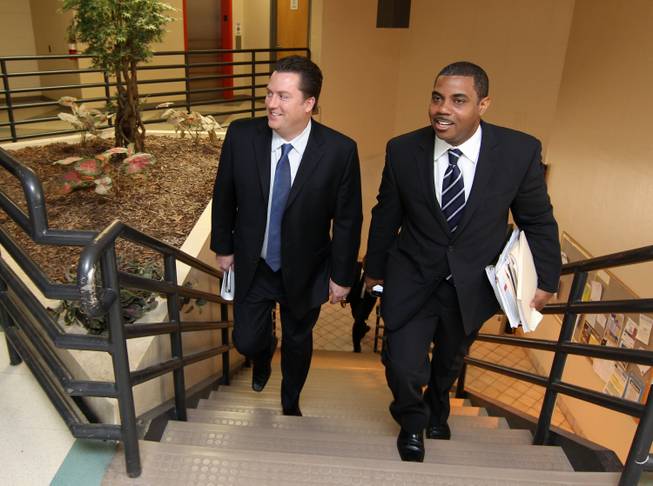
AP Photo/Cathleen Allison
Nevada Assembly Speaker John Oceguera, D-Las Vegas, left, and Senate Majority Leader Steven Horsford, D-North Las Vegas, arrive at a meeting with state business and community leaders Thursday, May 5, 2011, at Western Nevada College in Carson City. Democratic lawmakers continue to work on a tax plan despite Gov. Brian Sandoval’s stance against any tax or fee increases.
Thursday, May 5, 2011 | 8:05 p.m.
Sun coverage
CARSON CITY — The Legislature’s two Democratic leaders did their best Thursday to convince a conference hall full of skeptical business leaders that they have developed a sound plan to not only fix the budget deficit but stabilize Nevada’s tax structure.
After months of planning, quietly meeting with business leaders and stoking outrage toward Gov. Brian Sandoval’s budget, Senate Majority Leader Steven Horsford, D-North Las Vegas, and Assembly Speaker John Oceguera, D-Las Vegas, delivered their argument and their plan in a 90-page PowerPoint presentation.
That plan, they argued, would prevent debilitating cuts to education and social services, better capture the type of revenue being generated by Nevada’s economy, give businesses a certain future and rid the state of a payroll tax that hinders hiring.
In political terms, however, Democrats have a put forward options, each of which will garner varying levels of opposition and support.
And as they struggle to bring the session to a close with a $1.5 billion alternative to Sandoval’s budget, they’ll have to convince myriad power players with a matching set of special interests to join them in flipping at least five Republican lawmakers who have shown no sign of softening their support for the governor’s budget.
The options include:
• The proverbial can to kick down the road.
Simply removing the expiration date on the tax increase passed in 2009 would generate $626 million — more than half the new revenue they want to add back to Sandoval’s budget. But it would do nothing to provide long-term reform of the tax structure.
This has emerged as the easiest option to usher through a deeply divided Legislature, with both Republicans and Democrats agreeing it’s hard to consider it a tax increase. It also received the most telling support in the town-hall meeting Thursday.
At the meeting, former Harrah’s Entertainment CEO Phil Satre asked analyst Jeremy Aguero whether he had any evidence that payroll or other taxes have exacerbated the state’s economy.
“No,” Aguero answered simply.
The argument, in short, is if everyone keeps paying what they’re paying now, it won’t hurt economic recovery, which is the centerpiece of Sandoval’s opposition to taxes.
• A middle-of-the-road tax increase that both conservatives and liberals have supported in the past.
Imposing a small 1 to 4 percent tax on services such as hair cuts, auto repairs and legal services would better capture revenue from an economy dominated by consumer spending on services rather than goods, Aguero said.
Democrats want to sweeten that pot by gradually lowering the sales tax on goods by 1 percent.
The tax has been supported by conservative activists as a potential revenue neutral way to broaden Nevada’s tax structure and was fought for by the Las Vegas Chamber of Commerce in 2003.
As one business lobbyist said: “That’ll probably get our support. But not the franchise tax.”
• The new broad-based business tax.
Democrats have never liked the broad-based business tax passed after an all-out battle in 2003. The modified business tax assessed on payroll, they argue, is a disincentive for businesses to hire people or increase salaries.
They want to replace it with a tax on business revenue in a plan strikingly similar to the gross receipts tax proposal that brought the 2003 Legislature to a standstill
The new tax, which they’ve dubbed the margin tax, is more flexible than the gross receipts tax. Businesses that provide services could deduct wages and salaries. Businesses that produce goods could deduct those costs. High-tech businesses could perhaps deduct capital.
But the ambitious proposal, which has generated the most unease among business leaders, was cast too late in the session to be properly vetted, many argue.
As Nevada Retailers Association CEO Mary Lau put it: “You can’t do it in a month, slam it down people’s throats, without having a war.”

Join the Discussion:
Check this out for a full explanation of our conversion to the LiveFyre commenting system and instructions on how to sign up for an account.
Full comments policy